HA2022 Business Law Online Exam Trimester 3, 2019: Key Legal Concepts
VerifiedAdded on 2022/09/06
|8
|1874
|16
Homework Assignment
AI Summary
This document provides a comprehensive solution to a business law assignment, addressing key concepts such as insurable interest, the distinction between employees and independent contractors, and the implications of vicarious liability. The assignment explores the legal requirements for insurable interest, the validity of contracts with individuals of unsound mind, and the application of Australian Consumer Law regarding misleading or deceptive conduct. The solution includes detailed explanations, case analysis, and relevant legal references to support the answers. The document also analyzes specific scenarios, like a delivery boy's accident and a company's advertising campaign, to illustrate the practical application of legal principles. Overall, the assignment aims to provide a thorough understanding of core business law principles through a combination of theoretical explanations and practical examples.

LAW
STUDENT DETAILS
1-1-2020
STUDENT DETAILS
1-1-2020
Paraphrase This Document
Need a fresh take? Get an instant paraphrase of this document with our AI Paraphraser
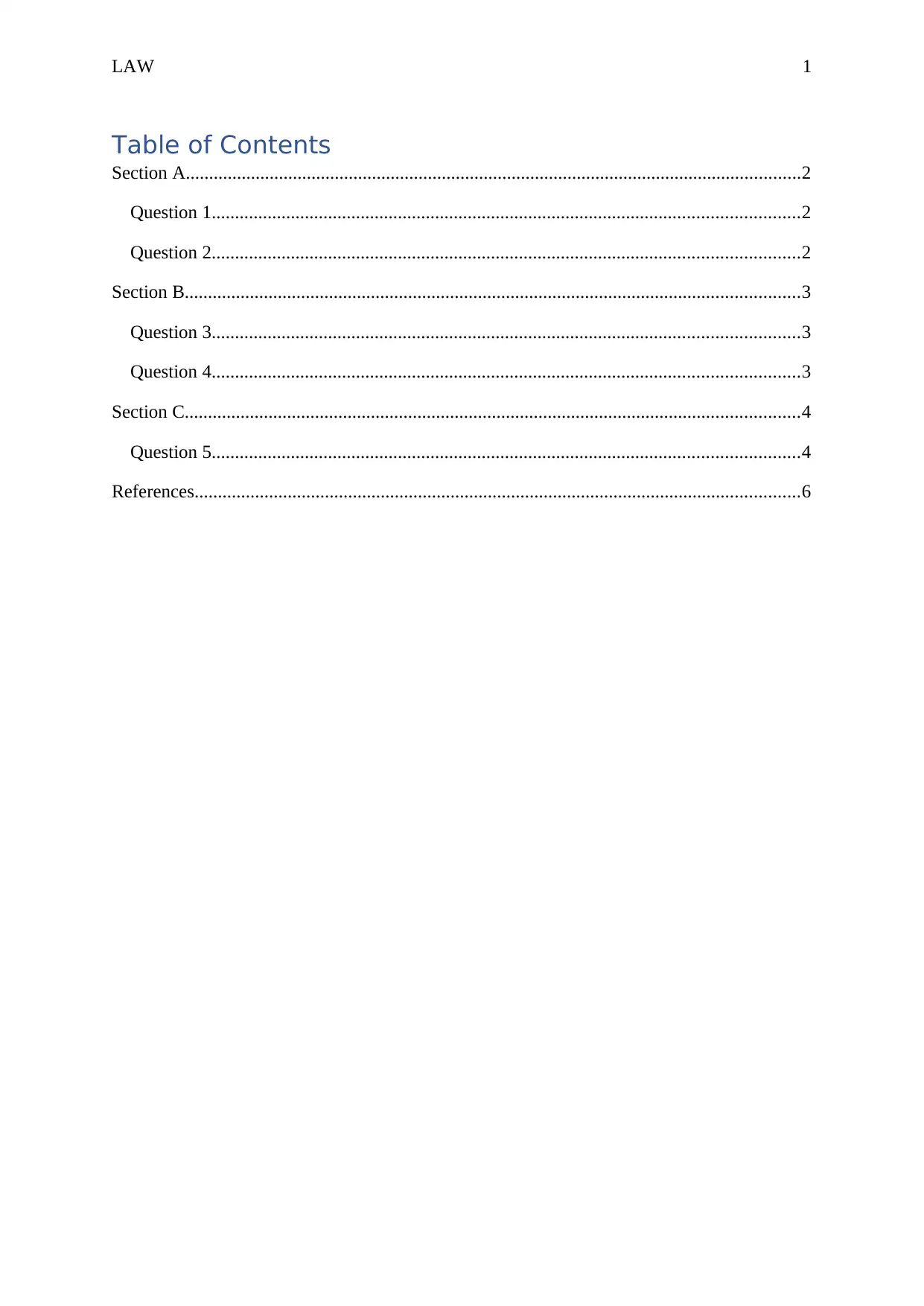
LAW 1
Table of Contents
Section A....................................................................................................................................2
Question 1..............................................................................................................................2
Question 2..............................................................................................................................2
Section B....................................................................................................................................3
Question 3..............................................................................................................................3
Question 4..............................................................................................................................3
Section C....................................................................................................................................4
Question 5..............................................................................................................................4
References..................................................................................................................................6
Table of Contents
Section A....................................................................................................................................2
Question 1..............................................................................................................................2
Question 2..............................................................................................................................2
Section B....................................................................................................................................3
Question 3..............................................................................................................................3
Question 4..............................................................................................................................3
Section C....................................................................................................................................4
Question 5..............................................................................................................................4
References..................................................................................................................................6
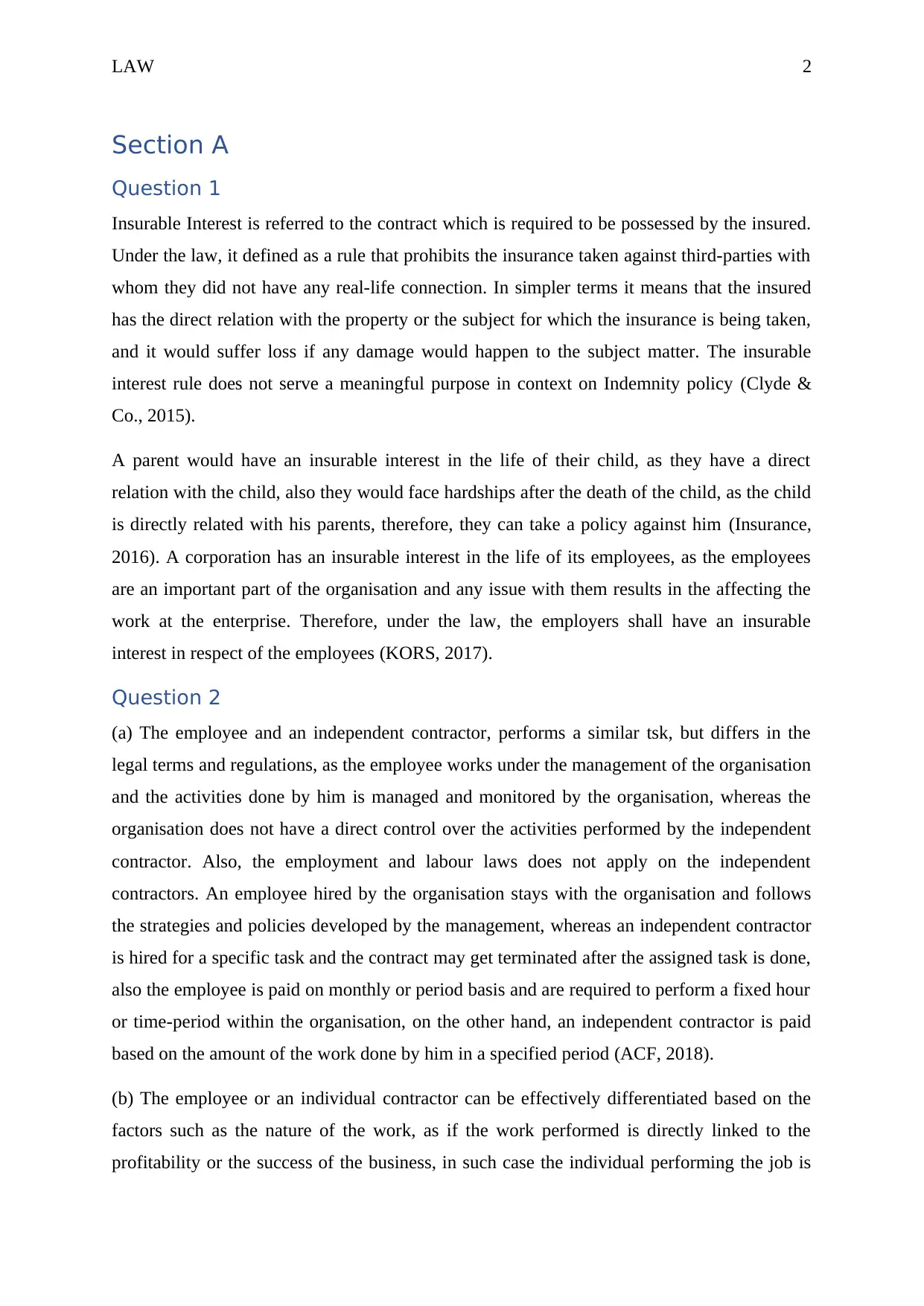
LAW 2
Section A
Question 1
Insurable Interest is referred to the contract which is required to be possessed by the insured.
Under the law, it defined as a rule that prohibits the insurance taken against third-parties with
whom they did not have any real-life connection. In simpler terms it means that the insured
has the direct relation with the property or the subject for which the insurance is being taken,
and it would suffer loss if any damage would happen to the subject matter. The insurable
interest rule does not serve a meaningful purpose in context on Indemnity policy (Clyde &
Co., 2015).
A parent would have an insurable interest in the life of their child, as they have a direct
relation with the child, also they would face hardships after the death of the child, as the child
is directly related with his parents, therefore, they can take a policy against him (Insurance,
2016). A corporation has an insurable interest in the life of its employees, as the employees
are an important part of the organisation and any issue with them results in the affecting the
work at the enterprise. Therefore, under the law, the employers shall have an insurable
interest in respect of the employees (KORS, 2017).
Question 2
(a) The employee and an independent contractor, performs a similar tsk, but differs in the
legal terms and regulations, as the employee works under the management of the organisation
and the activities done by him is managed and monitored by the organisation, whereas the
organisation does not have a direct control over the activities performed by the independent
contractor. Also, the employment and labour laws does not apply on the independent
contractors. An employee hired by the organisation stays with the organisation and follows
the strategies and policies developed by the management, whereas an independent contractor
is hired for a specific task and the contract may get terminated after the assigned task is done,
also the employee is paid on monthly or period basis and are required to perform a fixed hour
or time-period within the organisation, on the other hand, an independent contractor is paid
based on the amount of the work done by him in a specified period (ACF, 2018).
(b) The employee or an individual contractor can be effectively differentiated based on the
factors such as the nature of the work, as if the work performed is directly linked to the
profitability or the success of the business, in such case the individual performing the job is
Section A
Question 1
Insurable Interest is referred to the contract which is required to be possessed by the insured.
Under the law, it defined as a rule that prohibits the insurance taken against third-parties with
whom they did not have any real-life connection. In simpler terms it means that the insured
has the direct relation with the property or the subject for which the insurance is being taken,
and it would suffer loss if any damage would happen to the subject matter. The insurable
interest rule does not serve a meaningful purpose in context on Indemnity policy (Clyde &
Co., 2015).
A parent would have an insurable interest in the life of their child, as they have a direct
relation with the child, also they would face hardships after the death of the child, as the child
is directly related with his parents, therefore, they can take a policy against him (Insurance,
2016). A corporation has an insurable interest in the life of its employees, as the employees
are an important part of the organisation and any issue with them results in the affecting the
work at the enterprise. Therefore, under the law, the employers shall have an insurable
interest in respect of the employees (KORS, 2017).
Question 2
(a) The employee and an independent contractor, performs a similar tsk, but differs in the
legal terms and regulations, as the employee works under the management of the organisation
and the activities done by him is managed and monitored by the organisation, whereas the
organisation does not have a direct control over the activities performed by the independent
contractor. Also, the employment and labour laws does not apply on the independent
contractors. An employee hired by the organisation stays with the organisation and follows
the strategies and policies developed by the management, whereas an independent contractor
is hired for a specific task and the contract may get terminated after the assigned task is done,
also the employee is paid on monthly or period basis and are required to perform a fixed hour
or time-period within the organisation, on the other hand, an independent contractor is paid
based on the amount of the work done by him in a specified period (ACF, 2018).
(b) The employee or an individual contractor can be effectively differentiated based on the
factors such as the nature of the work, as if the work performed is directly linked to the
profitability or the success of the business, in such case the individual performing the job is
⊘ This is a preview!⊘
Do you want full access?
Subscribe today to unlock all pages.

Trusted by 1+ million students worldwide
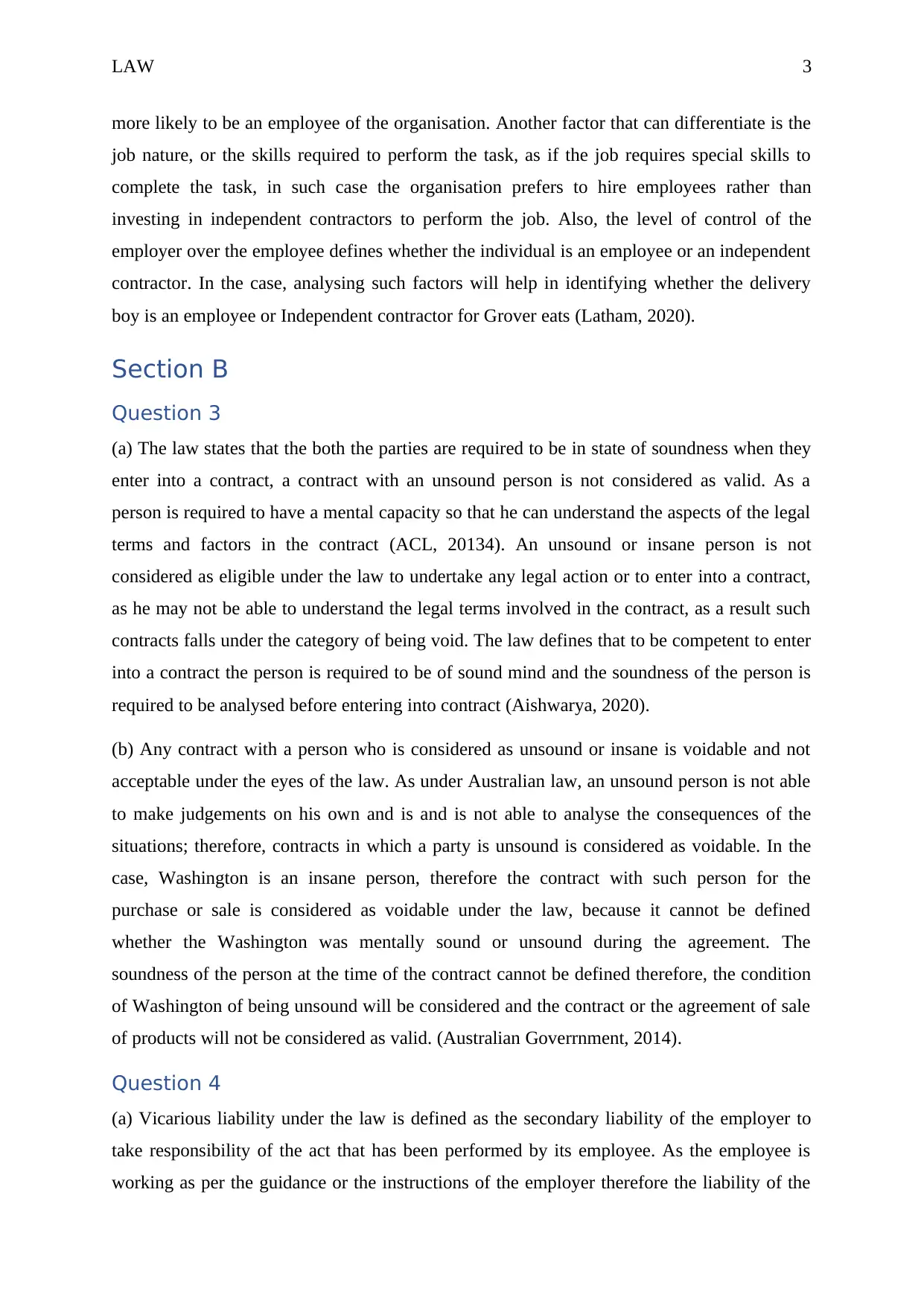
LAW 3
more likely to be an employee of the organisation. Another factor that can differentiate is the
job nature, or the skills required to perform the task, as if the job requires special skills to
complete the task, in such case the organisation prefers to hire employees rather than
investing in independent contractors to perform the job. Also, the level of control of the
employer over the employee defines whether the individual is an employee or an independent
contractor. In the case, analysing such factors will help in identifying whether the delivery
boy is an employee or Independent contractor for Grover eats (Latham, 2020).
Section B
Question 3
(a) The law states that the both the parties are required to be in state of soundness when they
enter into a contract, a contract with an unsound person is not considered as valid. As a
person is required to have a mental capacity so that he can understand the aspects of the legal
terms and factors in the contract (ACL, 20134). An unsound or insane person is not
considered as eligible under the law to undertake any legal action or to enter into a contract,
as he may not be able to understand the legal terms involved in the contract, as a result such
contracts falls under the category of being void. The law defines that to be competent to enter
into a contract the person is required to be of sound mind and the soundness of the person is
required to be analysed before entering into contract (Aishwarya, 2020).
(b) Any contract with a person who is considered as unsound or insane is voidable and not
acceptable under the eyes of the law. As under Australian law, an unsound person is not able
to make judgements on his own and is and is not able to analyse the consequences of the
situations; therefore, contracts in which a party is unsound is considered as voidable. In the
case, Washington is an insane person, therefore the contract with such person for the
purchase or sale is considered as voidable under the law, because it cannot be defined
whether the Washington was mentally sound or unsound during the agreement. The
soundness of the person at the time of the contract cannot be defined therefore, the condition
of Washington of being unsound will be considered and the contract or the agreement of sale
of products will not be considered as valid. (Australian Goverrnment, 2014).
Question 4
(a) Vicarious liability under the law is defined as the secondary liability of the employer to
take responsibility of the act that has been performed by its employee. As the employee is
working as per the guidance or the instructions of the employer therefore the liability of the
more likely to be an employee of the organisation. Another factor that can differentiate is the
job nature, or the skills required to perform the task, as if the job requires special skills to
complete the task, in such case the organisation prefers to hire employees rather than
investing in independent contractors to perform the job. Also, the level of control of the
employer over the employee defines whether the individual is an employee or an independent
contractor. In the case, analysing such factors will help in identifying whether the delivery
boy is an employee or Independent contractor for Grover eats (Latham, 2020).
Section B
Question 3
(a) The law states that the both the parties are required to be in state of soundness when they
enter into a contract, a contract with an unsound person is not considered as valid. As a
person is required to have a mental capacity so that he can understand the aspects of the legal
terms and factors in the contract (ACL, 20134). An unsound or insane person is not
considered as eligible under the law to undertake any legal action or to enter into a contract,
as he may not be able to understand the legal terms involved in the contract, as a result such
contracts falls under the category of being void. The law defines that to be competent to enter
into a contract the person is required to be of sound mind and the soundness of the person is
required to be analysed before entering into contract (Aishwarya, 2020).
(b) Any contract with a person who is considered as unsound or insane is voidable and not
acceptable under the eyes of the law. As under Australian law, an unsound person is not able
to make judgements on his own and is and is not able to analyse the consequences of the
situations; therefore, contracts in which a party is unsound is considered as voidable. In the
case, Washington is an insane person, therefore the contract with such person for the
purchase or sale is considered as voidable under the law, because it cannot be defined
whether the Washington was mentally sound or unsound during the agreement. The
soundness of the person at the time of the contract cannot be defined therefore, the condition
of Washington of being unsound will be considered and the contract or the agreement of sale
of products will not be considered as valid. (Australian Goverrnment, 2014).
Question 4
(a) Vicarious liability under the law is defined as the secondary liability of the employer to
take responsibility of the act that has been performed by its employee. As the employee is
working as per the guidance or the instructions of the employer therefore the liability of the
Paraphrase This Document
Need a fresh take? Get an instant paraphrase of this document with our AI Paraphraser
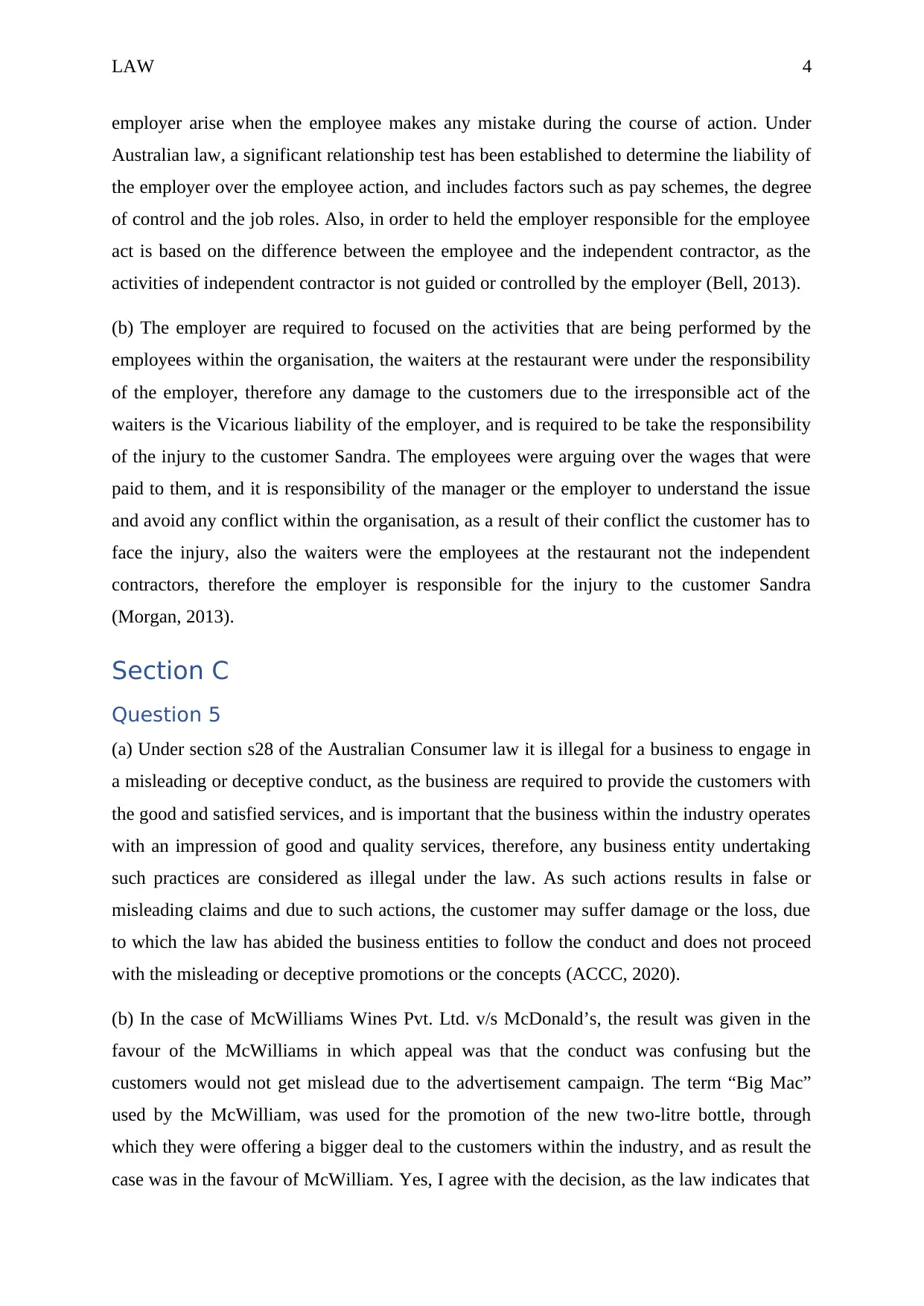
LAW 4
employer arise when the employee makes any mistake during the course of action. Under
Australian law, a significant relationship test has been established to determine the liability of
the employer over the employee action, and includes factors such as pay schemes, the degree
of control and the job roles. Also, in order to held the employer responsible for the employee
act is based on the difference between the employee and the independent contractor, as the
activities of independent contractor is not guided or controlled by the employer (Bell, 2013).
(b) The employer are required to focused on the activities that are being performed by the
employees within the organisation, the waiters at the restaurant were under the responsibility
of the employer, therefore any damage to the customers due to the irresponsible act of the
waiters is the Vicarious liability of the employer, and is required to be take the responsibility
of the injury to the customer Sandra. The employees were arguing over the wages that were
paid to them, and it is responsibility of the manager or the employer to understand the issue
and avoid any conflict within the organisation, as a result of their conflict the customer has to
face the injury, also the waiters were the employees at the restaurant not the independent
contractors, therefore the employer is responsible for the injury to the customer Sandra
(Morgan, 2013).
Section C
Question 5
(a) Under section s28 of the Australian Consumer law it is illegal for a business to engage in
a misleading or deceptive conduct, as the business are required to provide the customers with
the good and satisfied services, and is important that the business within the industry operates
with an impression of good and quality services, therefore, any business entity undertaking
such practices are considered as illegal under the law. As such actions results in false or
misleading claims and due to such actions, the customer may suffer damage or the loss, due
to which the law has abided the business entities to follow the conduct and does not proceed
with the misleading or deceptive promotions or the concepts (ACCC, 2020).
(b) In the case of McWilliams Wines Pvt. Ltd. v/s McDonald’s, the result was given in the
favour of the McWilliams in which appeal was that the conduct was confusing but the
customers would not get mislead due to the advertisement campaign. The term “Big Mac”
used by the McWilliam, was used for the promotion of the new two-litre bottle, through
which they were offering a bigger deal to the customers within the industry, and as result the
case was in the favour of McWilliam. Yes, I agree with the decision, as the law indicates that
employer arise when the employee makes any mistake during the course of action. Under
Australian law, a significant relationship test has been established to determine the liability of
the employer over the employee action, and includes factors such as pay schemes, the degree
of control and the job roles. Also, in order to held the employer responsible for the employee
act is based on the difference between the employee and the independent contractor, as the
activities of independent contractor is not guided or controlled by the employer (Bell, 2013).
(b) The employer are required to focused on the activities that are being performed by the
employees within the organisation, the waiters at the restaurant were under the responsibility
of the employer, therefore any damage to the customers due to the irresponsible act of the
waiters is the Vicarious liability of the employer, and is required to be take the responsibility
of the injury to the customer Sandra. The employees were arguing over the wages that were
paid to them, and it is responsibility of the manager or the employer to understand the issue
and avoid any conflict within the organisation, as a result of their conflict the customer has to
face the injury, also the waiters were the employees at the restaurant not the independent
contractors, therefore the employer is responsible for the injury to the customer Sandra
(Morgan, 2013).
Section C
Question 5
(a) Under section s28 of the Australian Consumer law it is illegal for a business to engage in
a misleading or deceptive conduct, as the business are required to provide the customers with
the good and satisfied services, and is important that the business within the industry operates
with an impression of good and quality services, therefore, any business entity undertaking
such practices are considered as illegal under the law. As such actions results in false or
misleading claims and due to such actions, the customer may suffer damage or the loss, due
to which the law has abided the business entities to follow the conduct and does not proceed
with the misleading or deceptive promotions or the concepts (ACCC, 2020).
(b) In the case of McWilliams Wines Pvt. Ltd. v/s McDonald’s, the result was given in the
favour of the McWilliams in which appeal was that the conduct was confusing but the
customers would not get mislead due to the advertisement campaign. The term “Big Mac”
used by the McWilliam, was used for the promotion of the new two-litre bottle, through
which they were offering a bigger deal to the customers within the industry, and as result the
case was in the favour of McWilliam. Yes, I agree with the decision, as the law indicates that
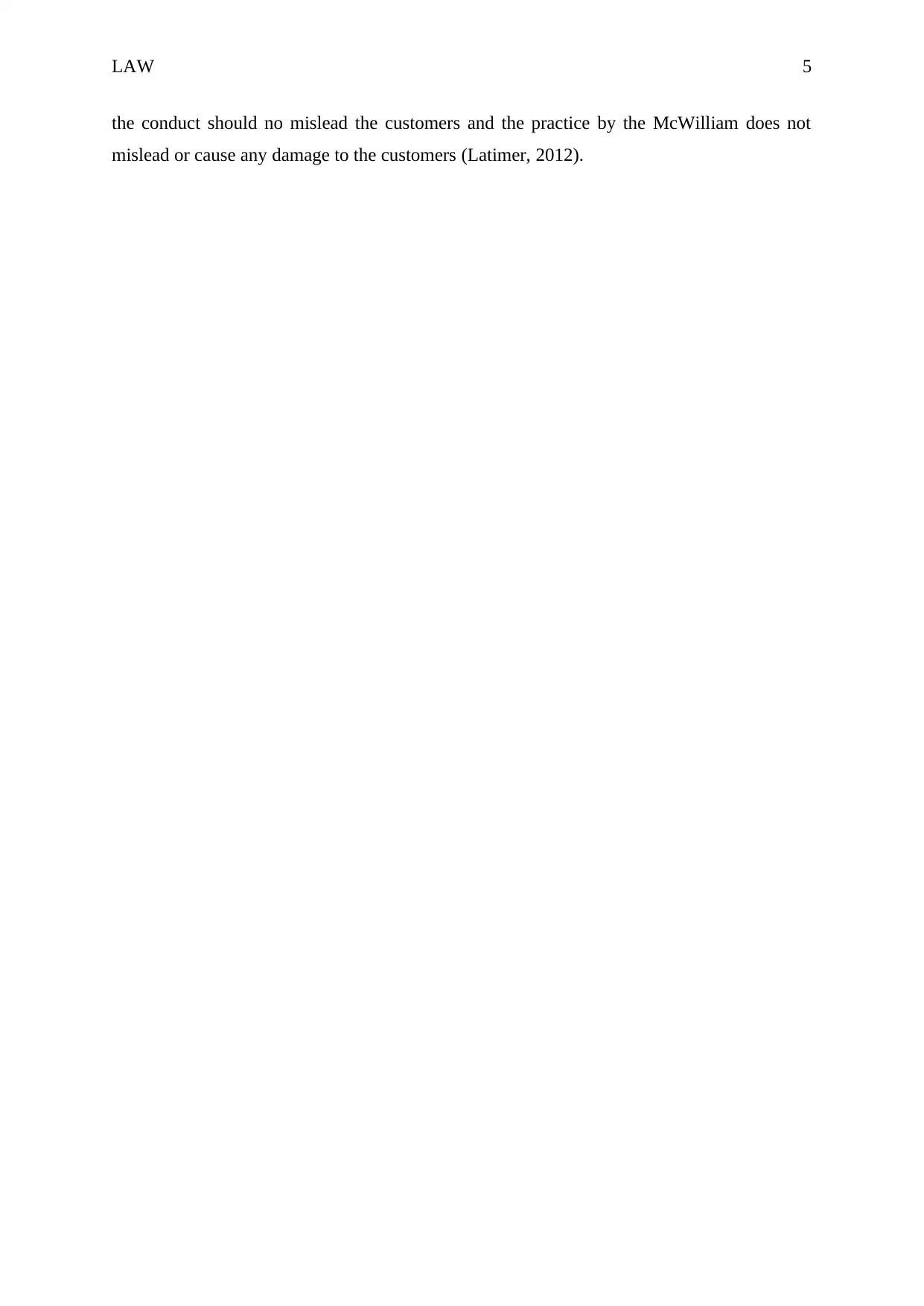
LAW 5
the conduct should no mislead the customers and the practice by the McWilliam does not
mislead or cause any damage to the customers (Latimer, 2012).
the conduct should no mislead the customers and the practice by the McWilliam does not
mislead or cause any damage to the customers (Latimer, 2012).
⊘ This is a preview!⊘
Do you want full access?
Subscribe today to unlock all pages.

Trusted by 1+ million students worldwide
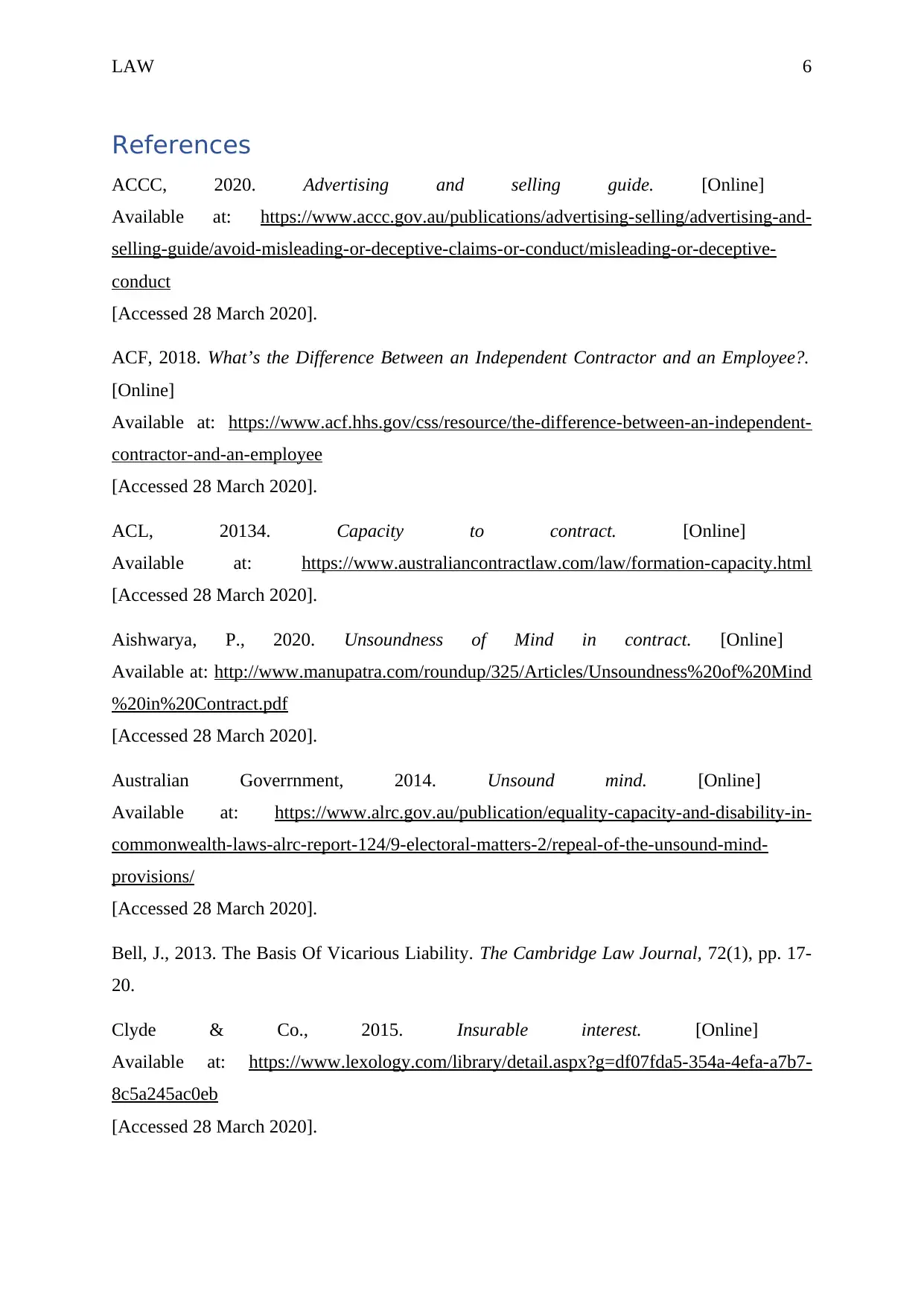
LAW 6
References
ACCC, 2020. Advertising and selling guide. [Online]
Available at: https://www.accc.gov.au/publications/advertising-selling/advertising-and-
selling-guide/avoid-misleading-or-deceptive-claims-or-conduct/misleading-or-deceptive-
conduct
[Accessed 28 March 2020].
ACF, 2018. What’s the Difference Between an Independent Contractor and an Employee?.
[Online]
Available at: https://www.acf.hhs.gov/css/resource/the-difference-between-an-independent-
contractor-and-an-employee
[Accessed 28 March 2020].
ACL, 20134. Capacity to contract. [Online]
Available at: https://www.australiancontractlaw.com/law/formation-capacity.html
[Accessed 28 March 2020].
Aishwarya, P., 2020. Unsoundness of Mind in contract. [Online]
Available at: http://www.manupatra.com/roundup/325/Articles/Unsoundness%20of%20Mind
%20in%20Contract.pdf
[Accessed 28 March 2020].
Australian Goverrnment, 2014. Unsound mind. [Online]
Available at: https://www.alrc.gov.au/publication/equality-capacity-and-disability-in-
commonwealth-laws-alrc-report-124/9-electoral-matters-2/repeal-of-the-unsound-mind-
provisions/
[Accessed 28 March 2020].
Bell, J., 2013. The Basis Of Vicarious Liability. The Cambridge Law Journal, 72(1), pp. 17-
20.
Clyde & Co., 2015. Insurable interest. [Online]
Available at: https://www.lexology.com/library/detail.aspx?g=df07fda5-354a-4efa-a7b7-
8c5a245ac0eb
[Accessed 28 March 2020].
References
ACCC, 2020. Advertising and selling guide. [Online]
Available at: https://www.accc.gov.au/publications/advertising-selling/advertising-and-
selling-guide/avoid-misleading-or-deceptive-claims-or-conduct/misleading-or-deceptive-
conduct
[Accessed 28 March 2020].
ACF, 2018. What’s the Difference Between an Independent Contractor and an Employee?.
[Online]
Available at: https://www.acf.hhs.gov/css/resource/the-difference-between-an-independent-
contractor-and-an-employee
[Accessed 28 March 2020].
ACL, 20134. Capacity to contract. [Online]
Available at: https://www.australiancontractlaw.com/law/formation-capacity.html
[Accessed 28 March 2020].
Aishwarya, P., 2020. Unsoundness of Mind in contract. [Online]
Available at: http://www.manupatra.com/roundup/325/Articles/Unsoundness%20of%20Mind
%20in%20Contract.pdf
[Accessed 28 March 2020].
Australian Goverrnment, 2014. Unsound mind. [Online]
Available at: https://www.alrc.gov.au/publication/equality-capacity-and-disability-in-
commonwealth-laws-alrc-report-124/9-electoral-matters-2/repeal-of-the-unsound-mind-
provisions/
[Accessed 28 March 2020].
Bell, J., 2013. The Basis Of Vicarious Liability. The Cambridge Law Journal, 72(1), pp. 17-
20.
Clyde & Co., 2015. Insurable interest. [Online]
Available at: https://www.lexology.com/library/detail.aspx?g=df07fda5-354a-4efa-a7b7-
8c5a245ac0eb
[Accessed 28 March 2020].
Paraphrase This Document
Need a fresh take? Get an instant paraphrase of this document with our AI Paraphraser
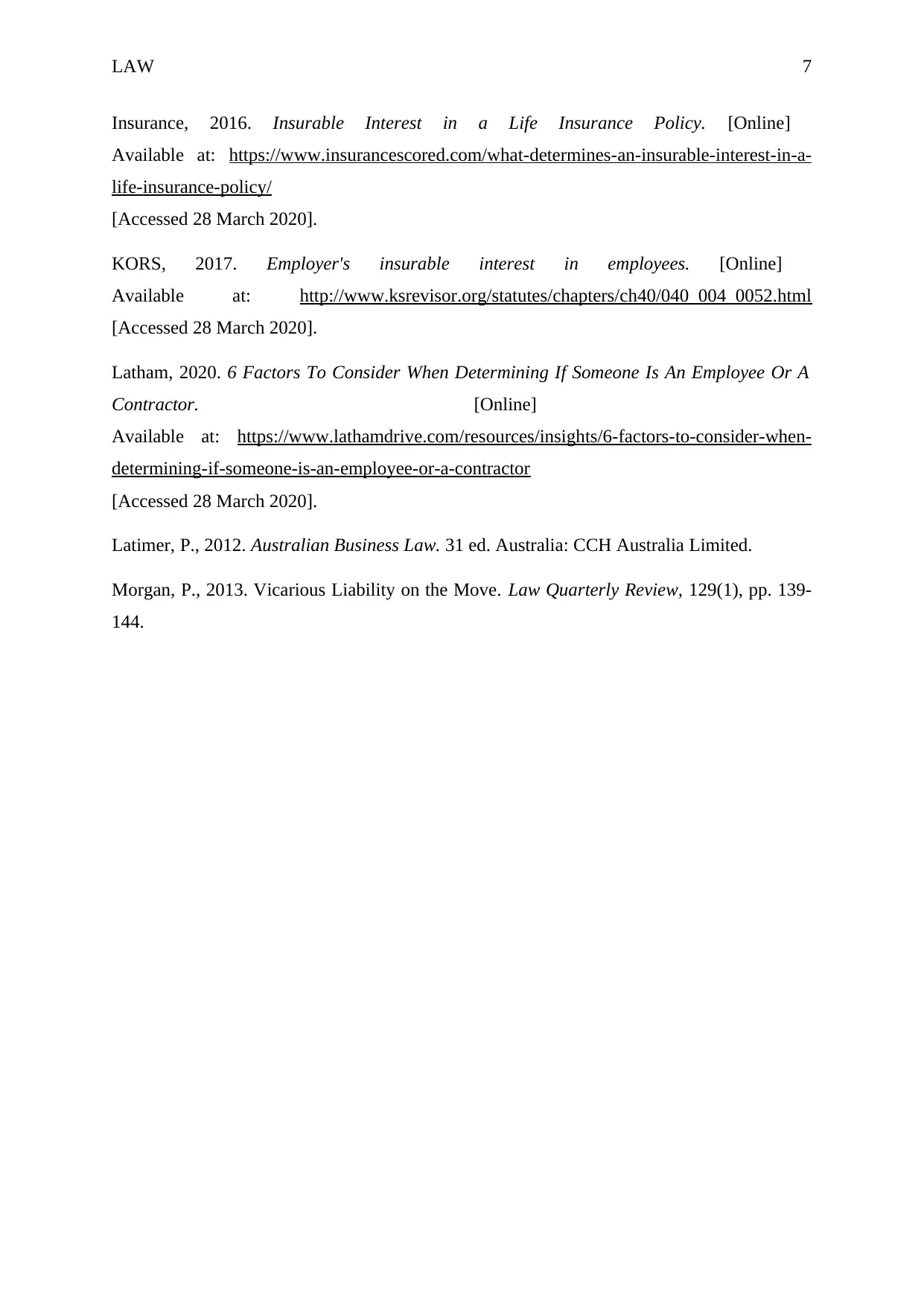
LAW 7
Insurance, 2016. Insurable Interest in a Life Insurance Policy. [Online]
Available at: https://www.insurancescored.com/what-determines-an-insurable-interest-in-a-
life-insurance-policy/
[Accessed 28 March 2020].
KORS, 2017. Employer's insurable interest in employees. [Online]
Available at: http://www.ksrevisor.org/statutes/chapters/ch40/040_004_0052.html
[Accessed 28 March 2020].
Latham, 2020. 6 Factors To Consider When Determining If Someone Is An Employee Or A
Contractor. [Online]
Available at: https://www.lathamdrive.com/resources/insights/6-factors-to-consider-when-
determining-if-someone-is-an-employee-or-a-contractor
[Accessed 28 March 2020].
Latimer, P., 2012. Australian Business Law. 31 ed. Australia: CCH Australia Limited.
Morgan, P., 2013. Vicarious Liability on the Move. Law Quarterly Review, 129(1), pp. 139-
144.
Insurance, 2016. Insurable Interest in a Life Insurance Policy. [Online]
Available at: https://www.insurancescored.com/what-determines-an-insurable-interest-in-a-
life-insurance-policy/
[Accessed 28 March 2020].
KORS, 2017. Employer's insurable interest in employees. [Online]
Available at: http://www.ksrevisor.org/statutes/chapters/ch40/040_004_0052.html
[Accessed 28 March 2020].
Latham, 2020. 6 Factors To Consider When Determining If Someone Is An Employee Or A
Contractor. [Online]
Available at: https://www.lathamdrive.com/resources/insights/6-factors-to-consider-when-
determining-if-someone-is-an-employee-or-a-contractor
[Accessed 28 March 2020].
Latimer, P., 2012. Australian Business Law. 31 ed. Australia: CCH Australia Limited.
Morgan, P., 2013. Vicarious Liability on the Move. Law Quarterly Review, 129(1), pp. 139-
144.
1 out of 8
Related Documents
Your All-in-One AI-Powered Toolkit for Academic Success.
+13062052269
info@desklib.com
Available 24*7 on WhatsApp / Email
![[object Object]](/_next/static/media/star-bottom.7253800d.svg)
Unlock your academic potential
Copyright © 2020–2025 A2Z Services. All Rights Reserved. Developed and managed by ZUCOL.





